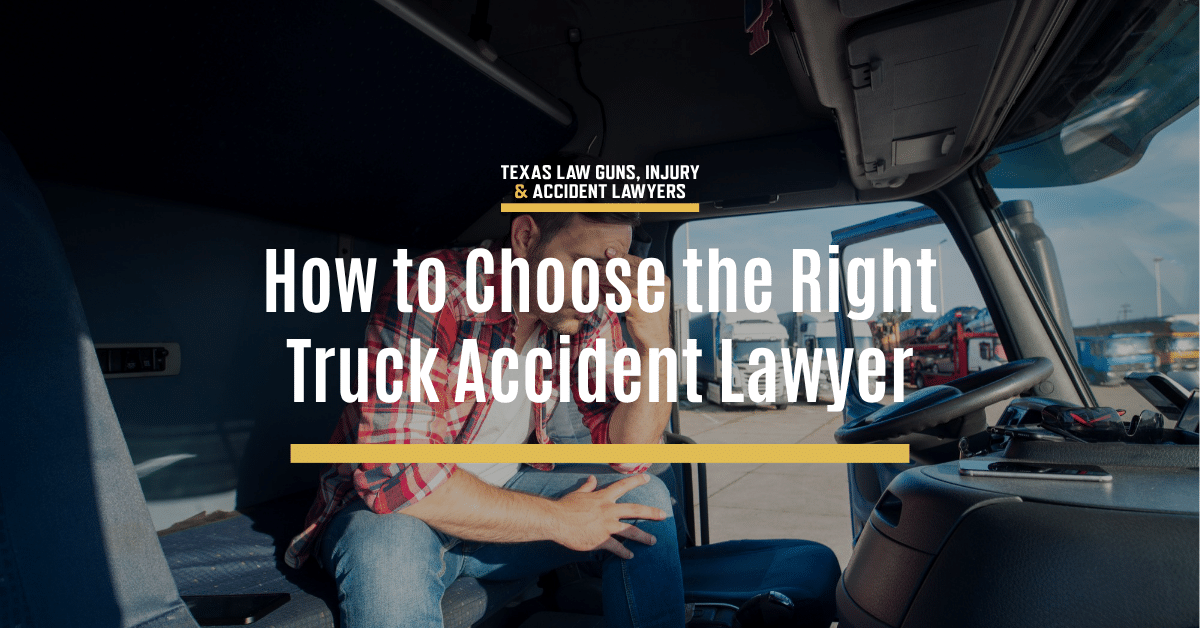Truck accidents are devastating events. The average fully-loaded big rig weighs approximately 80,000 lbs, so a high-velocity collision with a passenger vehicle, motorcyclist, or pedestrian is going to leave you with catastrophic injuries. According to the FMCSA, the average cost of a large-truck injury crash is about $383,168 per incident, while fatal collisions have led to average settlements and verdicts of over $14 million.
These are high-stakes cases with even higher medical expenses, and insurance adjusters aren’t going to pay this much compensation willingly. You need a truck accident lawyer who isn’t afraid to go up against them and win. However, finding the right attorney requires you to look beyond flashy billboard advertisements and evaluate real qualifications. In this guide, we’ll explain how to choose a truck accident lawyer who can get the results you need.
Why Truck Accident Cases Are Different from Car Accidents
An accident involving a semi-truck isn’t handled like a regular car wreck. As we stated above, commercial trucks can weigh up to 80,000 pounds fully loaded, and the damage they cause is on a completely different scale. When a big rig hits a car, the impact can destroy smaller vehicles and cause life-changing damage like a traumatic brain injury, spinal cord injuries, and compound fractures.
The difference also goes beyond vehicle size: trucking companies and their insurers are prepared to defend themselves the moment a crash happens, and they work fast to limit what they pay. You need to know what makes these cases stand apart before choosing who represents you.
- Multiple Defendants: Truck crashes often involve more than one responsible party. The driver, the trucking company, maintenance crews, cargo loaders, and even parts manufacturers can share the blame. Each group has its own insurance provider and legal team, which makes holding them accountable much more difficult. The right lawyer must know how to uncover who failed to follow safety rules and build the case from every angle.
- Complex Trucking Regulations: Federal and state laws also come into play. Truck drivers and carriers have to follow strict safety rules from the Federal Motor Carrier Safety Administration, including limits on hours of service, required inspections, and cargo weight limits. You need a truck accident lawyer who understands these rules and can spot violations that explain why the crash happened. Those details can turn a weak insurance claim into a strong one.
While most personal injury lawyers are willing to take on a truck accident claim, not all of them have the experience needed to win maximum compensation. In the sections that follow, we’ll discuss what you should specifically look for when interviewing potential attorneys for your case.
Step 1: Look for Proven Experience in Truck Accident Cases
You want a personal injury lawyer who understands how the trucking industry really works. A skilled lawyer can uncover what caused the crash, locate hidden records, and secure data that may prove negligence. They understand how federal regulations and Texas transportation laws apply to driver hours, equipment maintenance, and cargo weight. This experience shapes how quickly evidence is preserved and how confidently they can confront trucking companies that try to limit your financial compensation.
Here’s what you want to look for:
- Experience With Truck Accident Cases: Ask how many trucking cases the attorney has handled in the last several years. Lawyers who regularly manage these claims have already dealt with major carriers and their insurance teams. They know what information companies try to protect and how to compel its release.
- Knowledge of Federal and State Regulations: The best attorneys can apply the FMCSA regulations and the Texas Transportation Code to real-world accidents. They understand how a violation of these rules, such as skipped inspections or driver fatigue, affects liability.
- Access to Investigation Resources: Look for a personal injury law firm that works with accident reconstruction specialists, engineers, and medical consultants. These professionals help build a clear picture of how the trucking collision occurred and how the physical injuries relate to it.
- Courtroom Readiness: Many truck accident lawyers focus on settlement, but those with real trial experience create stronger leverage. Insurance carriers track which firms have successfully tried trucking cases and adjust their offers based on that record.
- Documented Case Results: Ask for examples of verdicts or settlements involving commercial trucks. Real outcomes demonstrate capability. Look for honest, verifiable results rather than marketing claims.
- Professional Communication: Pay attention to how the attorney explains complex subjects. Clear, direct language and steady follow-through signal professionalism and respect for your time.
When you meet with potential lawyers, treat those conversations like fact-finding sessions. Ask clear questions, and notice how directly they respond. The best attorneys explain their approach with confidence, use real examples to back up what they say, and have a record showing they can deliver real results for truck accident victims.
Step 2: Verify Reputation and Client Reviews
A truck accident lawyer’s reputation shows how they treat clients and handle cases beyond what their ads or website claim. You can learn a lot by checking reviews, professional ratings, and feedback from people who’ve actually worked with them. These sources reveal how the lawyer communicates as well as how the law firm handles challenges during a personal injury claim.
Check for the following:
- Verified Client Reviews: Start with Google, Avvo, and the Better Business Bureau. Read both positive and negative reviews. Look for patterns like how clients describe communication, case updates, and final results. One bad review doesn’t mean much, but repeated complaints about slow responses or missed updates should raise concern.
- Peer Recognition: Awards from legal organizations or comments from other attorneys show respect within the legal community. These acknowledgments reflect professionalism in negotiation and at trial.
- Response to Feedback: How a lawyer reacts to criticism says a lot about accountability. A calm, thoughtful reply to a negative review can show that the firm values client relationships.
- Word of Mouth: Ask people you trust for recommendations. Friends, family, or coworkers who’ve hired a truck accident attorney can offer insights you won’t find online.
- Firm Transparency: Reputable firms post information about their attorneys, practice areas, and past verdicts on their websites. If you can’t find that information easily, take it as a warning sign.
A solid reputation grows from consistent effort, honesty, and results. Before signing a contract, confirm that the attorney’s public record and client feedback reflect the level of professionalism you expect.
Step 3: Evaluate Communication and Accessibility
You can judge a trucking accident lawyer’s suitability by how they respond to you, how well they keep you informed, and how reachable they are when something changes. You also need to know who will handle your case day to day and how you can reach that person without waiting hours or days for a callback. You can test all of this before you sign.
Here’s what to test before you decide on your legal representation:
- Response Time Standards: Ask for a callback window in writing, such as within one business day, and request same-day acknowledgment for urgent issues. Send a test email or leave a message before you hire to see how fast they respond. Track how they handle follow-ups and whether they keep their promises.
- Direct Access To Your Lawyer: Confirm that you’ll have the trucking accident lawyer’s direct phone number and email, not only a main line. Ask who reviews evidence, who negotiates with the insurer, and who appears in court. When the lawyer you met stays involved, messages don’t get lost, your case moves faster, and the person who knows your file makes the key calls.
- Plain-Language Explanations: Ask them to explain how fault is proven and how damages are documented in simple terms. Have them walk you through an example from intake to demand without jargon. You should leave the meeting knowing what they will do next and why it helps your case.
- Documentation and Access to Your File: Find out how they store records, notes, and messages, and how you can view them. Ask for portal access or a plan for secure email if a portal isn’t available. Request an index of what’s in your file so you can check progress at any time.
- After-Hours And Weekend Coverage: Ask what happens if you need help outside business hours. Confirm a dedicated line, on-call rotation, or a promise to return messages by a set time the next day. Test the system once to see how it works in real life.
- Escalation Path For Problems: Ask who you contact if responses slow down or an issue stalls. Get the name of a supervising attorney or manager and a direct number. Clarify how they will fix delays and how quickly they’ll report back.
- Interpreter and Accessibility Support: If you need Spanish, ASL, large-print documents, or screen-reader-friendly files, ask for them now. Confirm they can schedule certified interpreters for hearings and doctor visits. Make sure any extra costs are explained in writing.
- Itemized Costs And Approvals: Ask how case costs are tracked and when you’ll see itemized statements. Confirm they won’t accept an offer or sign a release without your approval. Request the approval method in writing, such as a signed email or portal confirmation.
If a firm can’t give you this information before you sign, you can keep looking until you find one that will. That choice sets the tone for the rest of your case.
Step 4: Understand Their Fee Structure
You should know the fee terms before you sign. Most truck accident lawyers use a contingency fee arrangement, so you pay a percentage of the recovery and the firm advances case costs. You’ll avoid surprises by locking in percentages, cost handling, and approval rules in writing. Clear terms help you compare firms and protect your share of the recovery.
Here’s what you’ll want to ask about and confirm:
- Contingency Percentage and Triggers: Get the exact percentage at each stage, such as pre-suit, after filing, and after a trial setting. Confirm if the percentage changes when an early offer arrives and identify the event that causes the change. Put those numbers in the agreement so everyone works from the same figures.
- Case Costs, Timing, and Accounting: Request a list of costs the firm advances, such as records, depositions, experts, investigators, and travel. Confirm if costs are deducted before or after the attorney fee is calculated, since that choice affects your net. Set a schedule for itemized statements so you can see the running total and ask questions early.
- Sample Closing Statement: Review a redacted example that shows a real settlement breakdown. Look for the gross amount, the attorney fee, case costs, medical liens, and your net recovery. Seeing the line items helps you understand how the math plays out at the end.
- Medical Liens And Bills: Clarify who negotiates liens and how that work is billed. Note if the firm uses in-house staff or outside vendors and how those vendors are paid. Get a written plan for hospital liens, health insurer subrogation, Medicare or Medicaid issues, and provider balances.
- Settlement Approval Rules: Request written approval for any offer before acceptance. Agree on the method for approval, such as a signed email or portal confirmation that shows the amount and terms. Set a response window so you have time to review without pressure.
- Co-Counsel And Referral Fees: Identify whether any partner firm will be involved and how the fee is split. Get the names of all firms involved and who leads the strategy for your case. Meet that lead lawyer so you know who will speak for you in negotiations and in court.
- Ending the Representation: Pin down how you can terminate the agreement if things go wrong. Obtain the formula for fees and costs if you change firms or decide to stop the truck accident claim. Cap administrative charges so you do not face surprise invoices during a transition.
You should leave the meeting with the fee agreement in plain language and a sample closing statement that shows the math. You should also have a contact for billing questions and a schedule for itemized updates. If a truck accident firm avoids these topics or refuses to show examples, keep interviewing until you find one that puts the numbers in writing.
Contact a Texas Truck Accident Attorney Today
Choosing the right truck accident lawyer can impact how much compensation you receive. By checking a lawyer’s track record, reputation, communication style, and fee terms before you hire, you’re in a better position to work with someone who knows how to get results and protect your rights.
If you’ve been injured in a trucking collision, the time to act is now, before key evidence like driver logs, black box data, GPS data, and surveillance footage disappears. At Texas Law Guns, Injury & Accident Lawyers, we’re ready to start fighting for the compensation you’re owed. To schedule a free consultation and case evaluation, call our law firm at (866) 516-8291 or contact us online today. Spanish-speaking attorneys available.

Alexander Begum has tried over 50 trials to verdict and tried or settled over $500 million in cases. Alex is a founding shareholder of the Texas Law Gun, Injury and Accident Lawyers.




